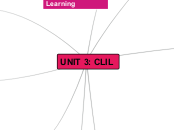UNIT 3: CLIL
Order of the language skills
Listening
Speaking
Reading
Writing
Elements
Environement
1 language - 1 persona - 1 room
Silent period
Speak slowly - articulate clearly
Appropiate level of language
Mime - gestures...
Repetition
Wealth of opportunities
4 language skills
Give importance to L2
Recognizin effort
4Cs
COMMUNICATION
Using language to learn
4 skills
Oral communication
Plurilingual interests and attitudes
Introducing a target language
Mother tongue
CULTURE
Exposure to alternative perspectives and shared understandings
Intercultural knowledge and understanding
Intercultural communication skills
Specific regions, minority groups...
Cultural context
CONTENT
Progression in knowledge and akills of a curriculum
Opportunities to study content
Subject - specific target language terminilogy
Future studies and working life
COGNITION
Developing thinking skills
Individual styles
Diversifying methods
Increase learner motivation
CLIL: Content and English Integrated Learning
What´s CLIL ?
Situations where subjects are taught throuh a foreign languaje with dual - focussed aims.
Why CLIL ?
Languaje acquisition is most effective
Promote foreing and minority languajes
Susbtantive basis for languaje learning
Dimensions
The culture dimension
The environement dimension
The language dimension
The content dimension
The learning dimension
Reflections
It is cyclical and recursive
Learners acquire best when they create
Semantic fluency precedes grammatical accuracy
Reading is essential
